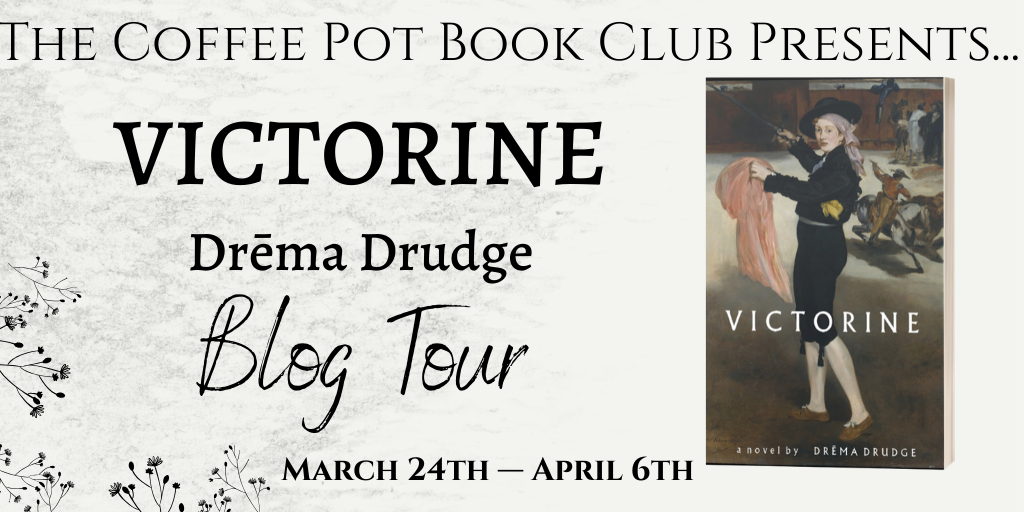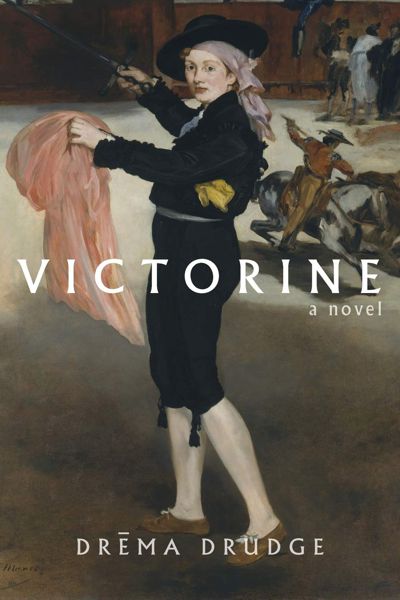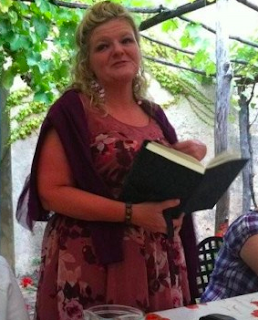
In 1863, Civil War is raging in the United States. Victorine Meurent is posing nude, in Paris, for paintings that will be heralded as the beginning of modern art: Manet’s Olympia and Picnic on the Grass.
However, Victorine’s persistent desire is not to be a model but to be a painter herself. In order to live authentically, she finds the strength to flout the expectations of her parents, bourgeois society, and the dominant male artists (whom she knows personally) while never losing her capacity for affection, kindness, and loyalty. Possessing both the incisive mind of a critic and the intuitive and unconventional impulses of an artist, Victorine and her survival instincts are tested in 1870, when the Prussian army lays siege to Paris and rat becomes a culinary delicacy.
Drema Drudge’s powerful first novel Victorine not only gives this determined and gifted artist back to us but also recreates an era of important transition into the modern world.

My Review:
I am a great fan of Manet, so I was especially interested in the story of his famous model for Olympia, the woman who looks at the viewer with such a disturbing direct gaze. Drema Drudge’s Victorine is—as might well be expected—disturbing in her own right. She is an original. No doubt about it. She leads a Bohemian lifestyle at a time when French painters were expressing their individualism in ways that conflicted with the mainstream, led by the talented Manet. He recognizes her charisma and invites her to be his model—a métier she finds herself well suited for. However, she may be more than he bargained for. Victorine feels that she is much more than a mere object; she feels that as a model, her contribution to the painting is critical. She helps determine what the viewer is supposed to feel; whether Manet likes it or not, she voices her opinion and criticizes without hesitation. At the same time, she is energized by his presence, and throughout his life she is obsessed with him, regardless of his own response to her (or lack thereof). During one of their interminable disagreements:
“I have violated his very soul, have taken credit (fairly so, I must believe) for what he feels is the fruit of his mind. It is only partly so. A man does not like to think he has not created everything himself, I am sure. I have ruined what would have been his finest painting to date; he will not finish it without me.
Worse, maybe he will finish it, painting over my head, erasing me as surely as my parents have done. As my mind calms, anger replaces sorrow. How can he not see what I have brought to the paintings? Why am I to have no credit? I’m well shed of him.”
Early on, Manet persuades her to model for him nude, and she is still young and inexperienced when she agrees. Alas, Olympia is way ahead of its time and the public is scandalized. Poor Victorine is the devastated target of their spite; they call her a whore, shun her, ostracize her, while Manet chooses this moment to absent himself from Paris, leaving Victorine to face his critics alone. I think this is when she understands that she is not as important to Manet as he is to her, compounded by the fact that he brings in other models, much to her chagrin. She begins to realize that the only way she will prove her own worth is as an artist, herself. This is a long-term goal and much has to happen before she takes that step.
This is not the kind of book you want to read for excitement and adventure. The pace is even, steady, sometimes slow. Victorine is a complicated character, and you must read on her terms. She toys with you, the reader, just like she toys with Manet and indeed, with herself. Her story is full of non-sequiturs and free associations. I don’t think she is ever happy. But I will say that I can never look at a Manet picture the same way again. Victorine has become a part of him, and this compelling story enriches his portraits of her and makes me look closer than ever before.


Drēma Drudge suffers from Stendhal’s Syndrome, the condition in which one becomes overwhelmed in the presence of great art. She attended Spalding University’s MFA in Creative Writing Program where she learned to transform that intensity into fiction.
Drēma has been writing in one capacity or another since she was nine, starting with terrible poems and graduating to melodramatic stories in junior high that her classmates passed around literature class.
She and her husband, musician and writer Barry Drudge, live in Indiana where they record their biweekly podcast, Writing All the Things, when not traveling. Her first novel, Victorine, was literally written in five countries while she and her husband wandered the globe. The pair has two grown children.
In addition to writing fiction, Drema has served as a writing coach, freelance writer, and educator. She’s represented by literary agent Lisa Gallagher of Defiore and Company.
Connect with Drema
Website: https://dremadrudge.com/
Twitter: https://twitter.com/dremadrudge
Instagram: https://www.instagram.com/dremadrudge/
The Painted Word Salon (Facebook): https://www.facebook.com/groups/485639358698462/members/
Thank you so much for hosting Drema, today. I am so glad you enjoyed Victorine!